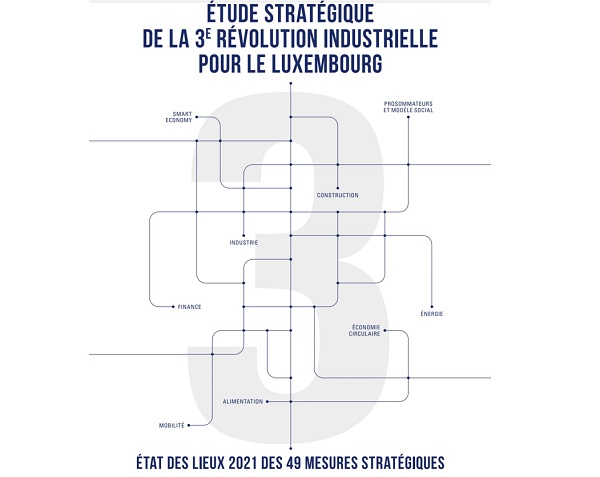 TIR Cover;
TIR Cover;
Luxembourg's Ministry of the Economy, the Chamber of Commerce and IMS Luxembourg have announced that the "Luxembourg Strategy" department at the Economy Ministry has taken over from the "Rifkin" process.
The “Third Industrial Revolution” (TIR) strategic study was carried out in 2016 to support Luxembourg's ecological and digital transition. The reflections carried out during this participatory process then contributed to the orientation of the country's economic policy.
At the start of 2021, the Ministry of the Economy, the Chamber of Commerce and IMS Luxembourg decided to carry out an inventory of the 49 strategic measures of the TIR and an assessment of the projects accomplished since its publication. This inventory showed that many measures resulting from the TIR process have been implemented in recent years, without necessarily being identified as directly related to this process.
Following this inventory, the three historical partners have deemed it useful to broaden the initial perspective. The current context has changed: the pandemic has revealed certain vulnerabilities in society and the economy and the megatrends, foreseen in the TIR study, have accelerated significantly. In addition, new international and community obligations have arisen from the challenges posed by climate change, with the aim of drastically reducing greenhouse gas emissions. The resilience of the economy and of society as a whole has thus become the key subject.
In his preface to the inventory, Luxembourg's Minister of the Economy, Franz Fayot, emphasised: “[...] There is a real need and a desire to continue forward-looking discussions in an open and holistic manner, without sectoral compartmentalisation. I fully share this wish and deduce that it is important to put in place a new governance for the process launched five years ago”.
Nancy Thomas, Director of IMS Luxembourg, and Carlo Thelen, Managing Director of the Chamber of Commerce, added: “The mobilisation of all the vital forces, the implementation of the measures already identified and the prioritization of projects, notably in the light of of the current health and economic crisis, must be at the heart of future work”.
Within the Ministry of the Economy, the “Luxembourg Strategy” department will ensure the continuation of prospective discussions. Its role is the long-term strategic exploration of the economy, by reconciling material, environmental and spatial constraints as well as possible with the needs of society and businesses. Luxembourg Strategy will broaden and deepen the reflections launched in the context of the TIR strategic study, in order to accelerate the transition to a sustainable and resilient economy and will set up the continuation of the discussions within the framework of an open forum with a holistic and collaborative approach.








